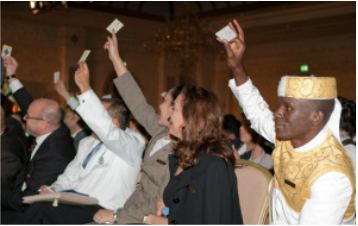 Ladies and Gentlemen of The Ritz-Carlton, Abu Dhabi (led by General Manager Pep Lozano, left) raise their Credo cards during a special event. Source: ArabianIndustry.com Ladies and Gentlemen of The Ritz-Carlton, Abu Dhabi (led by General Manager Pep Lozano, left) raise their Credo cards during a special event. Source: ArabianIndustry.com The Ritz-Carlton Hotel Company defines luxury. Few organizations are as synonymous with exceptional service and experience leadership as this Marriott International subsidiary. With 87 hotels in 29 countries (and growing), The Ritz-Carlton leads the hotel industry with an unparalleled service standard. In the enduring battle for guest loyalty, The Ritz-Carlton reminds us that experiential moments drive business in the modern hotel industry. From the frontline housekeeper providing an evening's turndown service to the C-suite executives discussing recent "Wow Stories," The Ritz-Carlton has struck gold in translating its cultural service cues (company-specific service interaction guidelines, as models for excellence) into its distinct and well-admired "Gold Standards." Owned and memorized by each Lady and Gentlemen (employees of The Ritz-Carlton), these core values are so essential to the company's service system that they are actually required elements of the uniform, in the shape of a pocket-sized "Credo card" carried by each member of the staff around the world. While Gallup surveys and numerous other metrics are employed by the company to facilitate an organization recognized twice with the U.S. Department of Commerce's Malcolm Baldrige National Quality Awards (1992 and 1999), the company can attribute much of its success to the consistency of excellence generated through the steadfast compliance with its core values. Specifically, these Gold Standards consist of six key elements:
Magic. Mystique. WOW. Among the upper echelon of the service industry, these words (and their numerous synonyms) announce legendary guest experiences. Whether its a Disney Cast Member in the Magic Kingdom requesting an autograph from a petite, preschool-aged princess or a Gentleman at the front desk of a Ritz-Carlton hotel offering a toast of champagne to arriving newlyweds, the goal of any experience creator is to build personalized engagements - and lifelong memories - as co-producers with the guests they served.
In organizations like Orlando's Walt Disney World Resort, it is easy to imagine the complexity of the operation and difficult to comprehend the degree of personalization offered to an astronomical volume of guests. Consider this in context: at Walt Disney World, more than 66,000 Cast Members holding 3,800 job classifications serve over 30 million visitors annually. The experience challenge is present across many companies around the world as they seek to drive cultures of quality service, but Disney stands out as a popularly-regarded champion. This post is the first in a series that will explore experience experts, like Disney, as we understand how each employs cultural service cues - company-specific service interaction guidelines - as models for excellence. Now, as Mickey Mouse might say, let's get on with the show! Experiences are the highest form of economic progress, and service-based businesses seeking competitive advantage need to transcend their already-customized offerings through advanced personalization. That, at least, is the theory developed by scholars B. Joseph Pine II and James H. Gilmore in their 1998 Harvard Business Review article “Welcome to the Experience Economy” and in their bestselling book The Experience Economy. The experience economy resulted from historical economic progressions stemming from value-addition in the marketplace: the agrarian economy that followed hunting and gathering was itself followed by the industrial economy and, in turn, by the service economy. Today, the service economy (based on the delivery of custom and intangible benefits to clients) precipitates the experience economy, which derives its value from the mass-personalized and staged experiences that produce temporal emotional responses (“sensations”) and memories for guests. Enjoy this classic TED Talk from Prof. Joseph Pine as he shares his insight into this popular paradigm shift that underscores the importance of the experience-based enterprises. |
